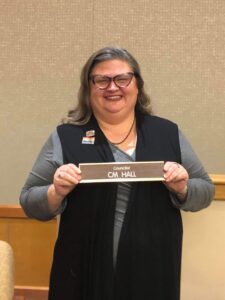
City governance is an institution that enables a community of citizens, through their elected representatives, to maintain safety and a good quality of life, which is accomplished by developing policy, adopting implementing laws and ordinances, and planning for the delivery and financing of public services. Success is dependent upon the ability to stay in touch with the public’s needs and desires, to understand the issues, and to balance the short and long term social, economic and environmental impacts.
In local government, it's very clear to your customers - your citizens - whether or not you're delivering. Either that pothole gets filled in, or it doesn't. The results are very much on display, and that creates a very healthy pressure to innovate.
--Pete Buttigieg
This spring, we held a training on how City Government works and were joined by a fantastic panel of three city councilors, including CM Hall (Newport), Carmen Matthews (Coos Bay), and Claire Syrett (Eugene). To watch the full recording of the Zoom session, scroll down to the bottom of the screen. Read below for the basics of Oregon city governance and highlights from our panel discussion.
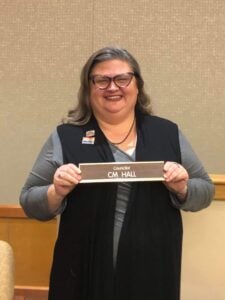 CM Hall, Newport
CM Hall, Newport
 Claire Syrett, Eugene
Claire Syrett, Eugene
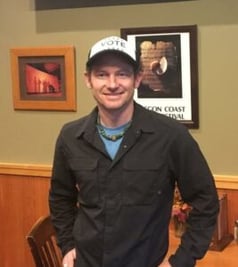 Carmen Matthews, Coos Bay
Carmen Matthews, Coos Bay
The Significance of "Home Rule"
- Oregon gives its towns and cities home rule—that is, the right to choose their own form of government.
- Most cities with populations of more than 5,000 have the council-manager form of government, in which the council decides the policy for the city and hires a chief executive officer to be responsible for the daily supervision of city affairs.
- Smaller Oregon cities typically have the mayor/council form, in which the legislative and policy-making body is a popularly-elected council.
- Portland is the only Oregon city with a commission form of government, in which elected commissioners function as the city council and administer city departments.
Basic City Services:
- Public Safety – police, fire, and sometimes ambulance service
- Utilities – water and sewer, trash collection, electricity, and natural gas
- Land Use – planning, zoning, code enforcement, etc.
- Transportation – street construction and maintenance, traffic safety, and sometimes public transit
- Recreation and Cultural – parks, recreation, libraries, etc.
- Legal – ordinances protecting the public health, safety
- Programs directly related to federal or state mandates.
The Mayor
- Role varies from city to city, depending on charter requirements.
- Serves as the public face of the community by representing the city at community events or government functions.
- Also serves as the spokesperson for the council.
- During council meetings, the mayor typically serves as the presiding officer and sets the agenda for meetings.
- Often, the mayor appoints individuals to committees and work groups and signs ordinances and resolutions on behalf of the council.
- Most importantly, the mayor serves as the chief facilitator between the city manager and the city council
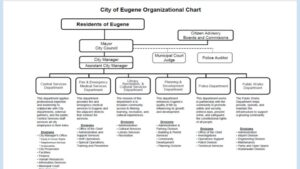 Example of City Structure
Example of City Structure
City Council
- City councils serve as the highest authority within city governments in deciding issues of public policy and public budget.
- In open public forums, city councils pass laws (ordinances), adopt resolutions and generally conduct discussions involving the governance of their communities and the welfare of their citizens.
- The council, as a collective body, is responsible for the oversight of administration in every city, but the roles that the mayor and individual councilors play in city administration vary considerably, depending on city size and form of government. Typically, the only city staff overseen by the council is the city’s chief executive and potentially a handful of department heads.
- City Council holds regular weekly meetings
- Agendas are published prior to meetings
- Agenda items include:
- Emergency and non-emergency ordinances
- Resolutions
- Communications
- Reports
- Consent Agenda
- Quasi-judicial proceedings
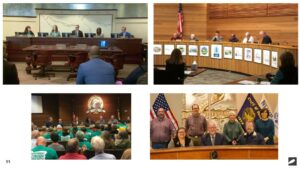
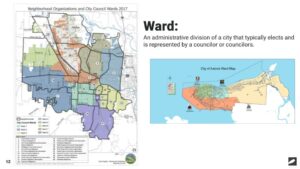
Council Decisions: One Voice
- The council acts as a centralized body with one voice and not as individuals.
- While individual council members may make motions, the motion must be “seconded” by another councilor to move forward and the motion is only passed when a majority of the council votes in favor of its passage.
- Newly elected and veteran elected officials may find this structure challenging as it may be difficult to pass policy based on individual platforms.
- The single most difficult job of a city council is to balance diverse interests with common interests.
- A council can seldom do everything that everyone wants.
Decision Making
- City councils generally make one of three types of decisions: legislative, executive and quasi-judicial. Councils may operate slightly differently, however, according their city’s charter or locally-adopted council rules.
- Councils make legislative decisions by enacting ordinances. A council must take a formal action to adopt an ordinance, and the process for adopting an ordinance is set out in the city charter. The process of adopting an ordinance must also conform with the council rules.
- The council rules may address whether the proposed ordinance must be made available to the public, or whether the public has the right to comment on the proposed ordinance.
- Ordinances versus resolutions:
- An ordinance is local law, enacted by the proper authorities, prescribing general, uniform, and permanent rules of conduct relating to the corporate affairs of the municipality. Ordinances are similar in nature to statutes enacted by the legislature, passed according to procedures required by state law or charter (such as notice, public hearing, required number of votes, and publication). Ordinances are generally considered “permanent,” and can only be amended by enacting a new ordinance. Typically, ordinances cannot go into effect immediately and some may be subject to referendum. Changes to a jurisdiction's criminal code, zoning code, or development regulations are common legislative acts accomplished through ordinances.
- A resolution typically deals with matters of a special or temporary nature and reflects an expression of opinion or policy. Resolutions are typically used when deciding to surplus public property, when directing the executive to take certain designated action, when adopting council or board rules of procedure, or when adopting personnel policies. In most instances, resolutions go into effect immediately.
Quasi-Judicial Decisions
- A city council has the power to make law (legislative) and the power to execute the law (administrative). The council also has the power to decide the rights of individuals or small groups of individuals by applying the law to a specific set of facts, essentially like a court in a “quasi-judicial” role.
- A three-part test is used to determine if a council is making a quasi-judicial decision:
- The council is applying a specific rule or policy;
- To a specific situation; and
- The council must make a final decision.
- Some common examples of quasi-judicial decisions include land use appeals, licensing appeals, personnel decisions, and contracting code disqualification appeals.
Public Meetings Law
- Under the public meetings law, a governing body’s meetings are open to the public with certain exceptions.
- Meetings of other city bodies such as the planning commission, budget committee, library board, etc., are also open to the public.
- Except in emergencies, there must be reasonable notice of regular meetings and at least 24-hour notice for special meetings.
- Minutes are required to be taken.
- Executive sessions – those meetings that may be closed to the general public – may be held for certain prescribed reasons, but the media must be allowed to attend these meetings and final decisions may not be made.
- All final decisions must be held in a public meeting.
- Prescribes handling of public records, but also how the local government must respond to and handle requests for disclosure.
Public Participation in Meetings
- Provide testimony on an agenda item (search your city’s website to register in advance)
- Written testimony before a meeting
- Verbal testimony during the meeting
- Communications: presentations on topic of your choosing
- Watch council meetings (in person or live-streamed)
- Check out this blog chronicling community action for the Newport, OR plastic bag ban ordinance
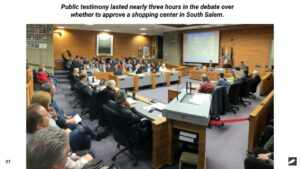
City Staff
- City administrators and other city employees often participate in the policy development process but are primarily responsible for effective delivery of municipal services and programs.
- Under home rule, cities have latitude in managing their affairs, except where the subject matter has been preempted by state government.
Committees, Boards, and Commissions
- Resident advisory groups that provide an invaluable service to the city by advising City Council and/or City staff on a wide variety of subjects
- Examples: Budget Advisory Committee, Planning Commission, Public Art Committee, Citizens Advisory Traffic Commission, Fair Housing Advisory Board, Human Rights Commission
- Some Commissions have decision making power. For example, the Planning Commission can approve or deny permits. However, Planning Commission decisions can be appealed to the City Council.
General Policy Process Steps
- Identification of problems or needs
- Establishment of community goals
- Determine objectives
- Development/analysis of alternative solutions (including short-term and long-term implications)
- Establishment of priorities
- Development of programs and strategies
- Implementation of programs and strategies
- Monitoring and evaluation of programs or strategies
- Feedback
- Program or strategy improvement and modification
Local Cooperation
- Regardless of the form of government, cities find their strength in a cooperative relationship between the citizens, city officials, the private sector and other government entities.
- Cities recognize the positive impact of working together, both regionally and on a statewide basis, to enhance community livability.
Intergovernmental Relations
- City officials play a pivotal role in the intergovernmental arena with other cities, county government, special districts and public schools, as well as regional, state and federal governments.
- Understanding these relationships and their impact on a city government’s ability to provide responsible, efficient and effective governance and delivery of services is important, particularly when funding and staffing resources are limited.
- Exploring new and innovative ways of funding and providing public services is one of the challenging issues facing elected officials.
- Even in light of home rule, local governments are subject to statutory, constitutional, judicial and charter limitations.
- Recents events that generated significant intergovernmental cooperation include the COVID-19 pandemic and wildfire response.
Panel Discussion with City Councilors
Introductions
CM Hall:
- Newport City Councilor. CM goes by she/her and they/them, and holds careers both as a sign language interpreter and LGBTQ educator at Western Oregon University. They have a pup named Callie they adopted during the pandemic.
Carmen Mathews:
- Coos Bay City Councilor. He is an avid surfer, but doesn't get to go out too much these days because he is quite busy between holding public office and owning the popular 7 Devils Brewing Co.
Claire Syrett:
- Served on Eugene City Council since 2012. Her day job is as a union rep for nurses at Peace Health facilities in Oregon. Fun fact: before she moved into this role, at one point she was going to pursue a career in aviation. She has her commercial multi-engine instrument rated pilot's license!
What motivated you to run for office?
Syrett:
- Before starting service on city council, she was recruited to apply for and sit on the budget committee, which is comprised of eight citizen members and eight city councilors. She served on that committee for 2.5 years which exposed her to the work of other committees, including human services. While serving in that role, she got feedback that the city council might be a good venue to offer her valuable skills and she received a lot of encouragement to run. Then Mayor Kitty Piercy directed her to a program called Emerge, a training program for democratic women who want to run for office. That set her up so that when a seat opened in her ward, she was able to successfully run for it.
Matthews:
- He is engaged in a multitude of public interests and organizations (such as Surfrider). He had gotten to know a lot of people in different factions and was getting to understand the workings of governmental decisions, as well as seeing a future down the line where he would want to run for public office. That's partly due to being involved in so many organization prior to election and saw he was able to work through contentious issues with a level head. Matthews notes it is a very important skill for any volunteer for any organization--to keep things professional and see the other side as much as possible.
- He was lucky that three positions were open and several councilors asked if he would run. He figured that if he was being invited, it was a good time to go for it! Sitting on the council has given him a "renewed confidence" in government protocol and government in general. He reports that they have a very functional government in Coos Bay. They don't always agree, but they are always respectful and that is a "breath of fresh air in today's world."
- Part of the reason he is involved in volunteer organizations is wanting to make a better place for his daughter and the next generation. He wants to leave this place better than he found it and give back to the community that shaped him. Through public office, he has that ability.
Hall:
- Hall is a lifelong Oregonian and in the early 1990's Oregon was working to defeat a couple of anti-LGBTQ ballot measures at the same time as she was coming out. Hall said their identity was a "political hot potato." Being queer was a partisan issue then, and sadly, still is. Hall came out and went to work trying to defeat anti-LGBTQ measures on a national and statewide level and worked to raise money for political organizations. They hoped to run for office eventually and felt like they had the voice to speak up for more marginalized identities.
- Hall was living in Portland, but always wanted to live on the coast and was lucky to be able to eventually move and do their job remotely. Hall was thrilled to move to Newport and wanted to be able to contribute to the community. Like Syrett, Hall had been through the Emerge program and is now actually on the board of directors of Emerge Oregon. Prior to working with democratic women, Hall had also worked to get LGBTQ candidates and allies elected. They felt like there's a lot of marginalized identities that need to be a the table and that they could help do that while living here in Newport, their dream home.
What is the best way for community members to communicate and form personal relationships with you?
Syrett:
- First of all, councilors get a lot of email, requests, etc. in their inbox. Because she works a full time job, she has to really figure out how to manage her time int he most effective way. So when she's sorting through emails, even if they are to the general council, she will typically respond if the author is a constituent in her ward and will definitely respond if a constituent reaches out to her specifically. A valuable thing to do is to ask for a one-on-one meeting, and she will definitely try to make time for that. Email is the best way to get in touch. She tries not to give our her personal number but has for certain neighborhood leaders.
Matthews:
- Echoes that email is the best way to get in touch and that personal meetings are the most impactful. He is willing to meet with people in his community as much is needed. He's busy, but flexible. He has a lot of conversations on the street while he's at his pub, which is great when he has time. But emailing him to schedule a meeting is even better and he never turns it down. And he wishes people did that more.
What is the best way to give compelling testimony?
Syrett:
- As for public comment, Eugene city council has recently changed their public forum. Traditionally, it was a very open forum where people still only had 3 minutes to give testimony but the meeting could last over 2.5 hours. They found that was very challenging in terms of managing their work time especially because they would often have more business after. So right before the pandemic, they changed it up and limited the time to 2.5 minutes for testimony and 90 minutes total.
- To be concise, she suggests stating your thesis, providing one or two examples and maybe a solution if you have one to offer, and thank the councilors for listening to your input.
- Sometimes people can be angry and upset. She can accept that and not be turned off by it if they are still giving clear testimony. But when they are insulting or demeaning or "assume councilors are idiots," it makes it harder to connect. So be respectful even when you are angry!
Matthews:
- When it comes to decorum during meetings, they are still at 3 minutes unless it is a special issue and they may change the time limit to allow more speakers. It's very important to be organized as an organization so you are not hitting the same topic over and over again. The bag ban, LNG terminal, and estuary were all examples of major, heavy public input topics. The council heard a lot of the same argument, but that's not as productive unfortunately. In that instance, emotional stories have a place, but to Matthews, too much of that can be detrimental to the argument. He wants to hear some emotion, but also wants to hear a lot of facts that he can use in his arguments for or against whatever it is you are trying to push. Matthews says, "Basically, I need ammunition to stand on your ground on your behalf, and I can't do that on just emotion. I need solid facts."
- Luckily, the council has been fortunate enough to hear testimony from organized groups that make it easy for the council to do their job and make decisions on the public sphere. If you can give a city councilor bullet points for them to make or communicate a decision, it really is helpful. If a councilor is on the fence between two sides of an issue, being given some solid points might really change where they swing.
- Also, any kind denigrating of councilors from either side is unacceptable. Being respectful is extremely important and the only way to get things done in city council in general, so he holds everyone to that standard.
Hall:
- Hall has a lot of empathy for people who are brave enough to come testify because she knows public speaking is a fear for many people. Hall empathizes when people are cut short on their prepared speeches, especially when they put their heart and soul into preparing it. They recommend having a 1 minute version and 3 minute speech planned just in case.
- Also, don't hesitate to come to public comment! It makes such a difference to see people there engaged in an issue and it's meaningful to the councilors when making a decision.
- The engagement of an organized group can be very helpful. For example, when during the bag ban decision, Surfrider was able to tally public comment and weigh it. 25% of testifiers were passionately against the ban, but they were outnumbered 3 to 1 and it was compelling to have that data.
- Student testimony is very compelling as well.
Any other useful or interesting advice?
Syrett:
- She really appreciates people coming to offer public comment. She's been in that spot too and knows what it's like to be nervous. Most city councils try to make people feel as welcome as possible even though they're in this imposing podium set-up. But the council is listening and paying attention and trying to be appreciative of that situation.
- Repetitive comments are challenging, so organized efforts are super important and those are the ways we get good policy. Organizers should help people give different chunks of information during their comments so if there are several people commenting on the same issue, the council is hearing different aspects of it.
- She notes that meeting virtually has opened up access to people who otherwise would not have the opportunity to give public comment. They are working on creating a hybrid format once meetings are in-person again and Syrett is excited to see how that will work.
Final words from both Hall and Matthews :
- Remember that there is not a criteria for what citizens should know. You know your lived experience, so bring your perspective!
